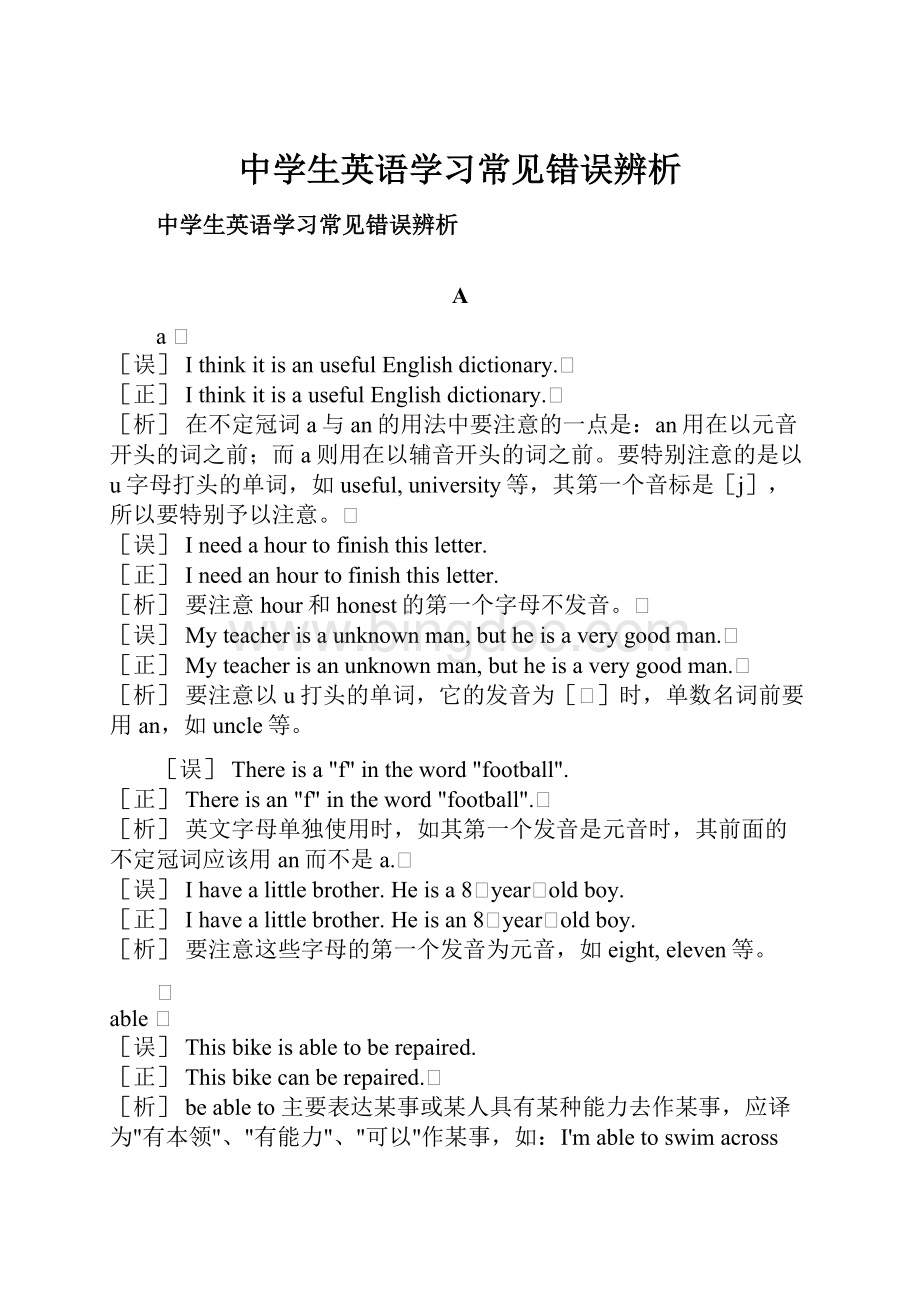中学生英语学习常见错误辨析.docx
《中学生英语学习常见错误辨析.docx》由会员分享,可在线阅读,更多相关《中学生英语学习常见错误辨析.docx(94页珍藏版)》请在冰点文库上搜索。

中学生英语学习常见错误辨析
中学生英语学习常见错误辨析
A
a
[误]IthinkitisanusefulEnglishdictionary.
[正]IthinkitisausefulEnglishdictionary.
[析]在不定冠词a与an的用法中要注意的一点是:
an用在以元音开头的词之前;而a则用在以辅音开头的词之前。
要特别注意的是以u字母打头的单词,如useful,university等,其第一个音标是[j],所以要特别予以注意。
[误]Ineedahourtofinishthisletter.
[正]Ineedanhourtofinishthisletter.
[析]要注意hour和honest的第一个字母不发音。
[误]Myteacherisaunknownman,butheisaverygoodman.
[正]Myteacherisanunknownman,butheisaverygoodman.
[析]要注意以u打头的单词,它的发音为[]时,单数名词前要用an,如uncle等。
[误]Thereisa"f"intheword"football".
[正]Thereisan"f"intheword"football".
[析]英文字母单独使用时,如其第一个发音是元音时,其前面的不定冠词应该用an而不是a.
[误]Ihavealittlebrother.Heisa8yearoldboy.
[正]Ihavealittlebrother.Heisan8yearoldboy.
[析]要注意这些字母的第一个发音为元音,如eight,eleven等。
able
[误]Thisbikeisabletoberepaired.
[正]Thisbikecanberepaired.
[析]beableto主要表达某事或某人具有某种能力去作某事,应译为"有本领"、"有能力"、"可以"作某事,如:
I'mabletoswimacrossthisriver.而can可以用来表示具有接受能力或吸收能力。
如:
Thisradiocanberepairedhere.
about
[误]Thisclassisabouttobeginjustnow.
[正]Thisclassisabouttobegin.
[析]要注意beaboutto是"将要"的意思,含有将来时之意,不要与表示过去时的时间状语连用。
另外,beaboutto一般用作书面语,对应的口语是begoingto.
abouton
about与on都可以作"关于"讲,但却有所不同,例如:
Thisbookisaboutphysics.应译为"这是一本关于物理学的科普读物。
"而:
Thisbookisonphysics.则应译为"这是一本物理学方面的专著。
"
above
[误]Thetemperatureisfivedegreesoverzero.
[正]Thetemperatureisfivedegreesabovezero.
[析]表达"在……上方"时,above与over是可以互换的,如:
Theskyisabove(orover)ourheads.但是要表达在垂直方向上的上方时则应用above不可用over,如:
Thesunhasrisenabovethehorizon.
[误]ThereisoftenthickcloudabovetheSouthofChinainsummer.
[正]ThereisoftenthickcloudovertheSouthofChinainsummer.
[析]当表达覆盖之意时,只可用over而不能用above.
[误]Thereisabridgeabovetheriver.
[正]Thereisabridgeovertheriver.
[析]用来表达"从……上方越过"时不能用above只能用over,如:
Theplaneflewoverthecity.但要注意Thereiswaterfallabovethebridge.则应译为"在桥的上游有一个瀑布。
"
across
[误]Heranacrossthewood.
[正]Heranthroughthewood.
[析]across是指某一动作在一平面内进行,而through则是指该动作在一三维立体空间的运动过程。
如:
Themancameinthroughthewindow.Hewalkedacrossthesquare.
across
across的主要用法有两个。
其一,意为"对面",如:
Thereisaschooljustacrossthestreet.其二,意为"横过",如:
Hewalkedacrossthestreet.
afraid
[误]Idont'tafraidofhim.
[正]Iamnotafraidofhim.
[析]要注意"害怕"afraid一词在英语中不是动词,而是形容词,要与be动词连用。
after
[误]Twoweeksafterheleft.
[正]Twoweekslaterheleft.
[正]Heleftaftertwoweeks.
[析]要表达"在多少时间之后",英语中有两种表达法,即:
用later时,要时间在前,如threehourslater;而用after时要时间在后,如afterthreehours.
[误]Myfatherwillbebackafterafewhours.
[正]Myfatherwillbebackinafewhours.
[析]受中文的影响,这个介词常常被误用。
当你要表达在一段时间内某个动作可以完成时,一定要用in,而不能用after,因为after是指在某一时间之后。
例如:
Thisworkwillbedoneintwodays.即表明在两天内这一工作一定会做完。
而如用了after,即表示在两天之后,完成的时间是不确定的。
afterbehind
after多用于表示顺序的前后,如:
ShewalkedinthelineafterTom.或用来表示"追赶",表示一种动态,如:
HeranafterMary.而behind多用于强调先进与落后,如:
Sheismuchbehindtheothergirlsinsewing.或者用于表达"迟于",如:
Thetrainwastenminutesbehindthetimetable.或者与表示静态的动词连用,如:
Shehidherselfbehindtheflowers.
afternoon
[误]Heworkedveryhardinahotafternoon.
[正]Heworkedveryhardonahotafternoon.
[析]习惯用的词组intheafternoon,如果加入任何修饰词后其前面的介词in都要改为on,不论其修饰词在前还是在后,如:
HeswaminthisriverontheafternoonofJunelst.又如:
AreyoufreeonSundayafternoon?
against
[误]Heagainstme.
[正]Heisagainstme.
[析]要注意against意为"反对",但它在英文中却不是动词,而是介词,如要讲反对某事或某人时则要加动词be,如:
Heisagainstsomebody/something.
againstfor
against意为"反对"、"不赞成";而for则意为"同意",为其反意词。
如:
Areyoufororagainsttheplan?
age
[误]Heistwentyyearsoldofage.
[正]Heistwenty.
[正]Heistwentyyearsold.
[正]Heisattheageoftwenty.
ago
[误]Tom'sfatherhasbeendeadfiveyearsago.
[正]Tom'sfatherdiedfiveyearsago.[析]ago意为由说话时算起,若干时间以前。
它只能和一般动词过去时连用,而不要与完成时连用。
[误]YesterdayImetafriend.Wedidn'tseeeachotherforalongtimesinceweleftthecollegetwentyyearsago.
[正]YesterdayImetafriend.Wehadn'tseeneachotherforalongtimesinceweleftthecollegetwentyyearsago.
[析]要注意的是在本句是ago是用在由since引起的从句之中,只是从句应用过去时,但不影响主句的时态。
agree
[误]Doestheteacheragreetous?
[正]Doestheteacheragreewithus?
[误]Doesheagreewithourplan?
[正]Doesheagreewithus?
[析]agreewith指"同意某人的提议、建议、计划"等。
如果要讲同意某项计划则要用agreeto,如:
Doyouagreetotheplan?
all
[误]Theoldmanhastwosons.Allofthemareworkers.
[正]Theoldmanhastwosons.Bothofthemareworkers.
[析]all是指三者或以上的全部,而both则是指"两者都"。
[误]Theallchildrenareplayingfootballnow.
[正]Allthechildrenareplayingfootballnow.
[析]all作修饰词时其位置要在所有的修饰词之前,不论这些修饰词是定冠词、指示代词、形容词或名词,或代词的所有格。
[误]Youallareright.
[正]Youareallright.
[析]all作同位语时其位置要置于be动词之后,实意动词之前,如:
Theteachersallworkhard.或用于第一助动词之后,如:
Theboyshaveallbeenwaitingfortheirmothers.
almost
[误]Nearlynobodythinksheisright.[正]Almostnobodythinksheisright.[析]nearly与almost是近意词,其含意差别不大,但是与否定词连用时要用almost,例如:
Shebroughtalmostnomoneywithher.此句中的almost不能用nearly替换。
alone
[误]Theoldmanlivedlonebuthedidn'tfeellonely.
[正]Theoldmanlivedalone,buthedidn'tfeellonely.
[析]alone,lone,lonely三个词全具有"孤单、孤独"之意。
但其用法不同:
lone可以作定语,而alone则只能作表语,lonely则多指感情上与感觉上的孤独。
already
[误]Wearealreadyforthework.
[正]Weareallreadyforthework.
[析]already是副词,其意为"已经",如:
Healreadyknewaboutit.而allready为形容词意为"准备好"。
alreadyyet
already多用于肯定句中,例如:
Thestudentshavealreadyfinishedthework.而yet则多用于疑问句与否定句中,如:
Haveyoufinishedityet?
Ihaven'tfinishedityet.
also
[误]Ididn'tfindthedictionaryalso.[正]Ididn'tfindthedictionaryeither.[析]作为"也"讲,在否定句中要用either而不能用also.
alsotoo
also与too都可用在肯定句中表示"也",但also通常用于be动词或情态动词之后,如:
Icanalsodoitmyself.而too一般放于句尾。
I'llattendhisclass,too.
always
[误]Alwaysheaskedhimselfwhyhehadcomehere.
[正]Healwaysaskedhimselfwhyhehadcomehere.
[析]always一般不能用于句首,它在一般句中的位置是于动词之前第一助动词之后,如:
I'vealwaysthoughtheishonest.又如:
Heisalwayslate.
among
[误]Ifthethreeapplesaredividedamongthetwoboyshowmuchwilleachreceive?
[正]Ifthethreeapplesaredividedamongthethreeboyshowmuchwilleachreceive?
[析]among常用于三个事物或人物之间,而between则多用于两者之间。
an
[误]Thisisanusefuldictionary.
[正]Thisisausefuldictionary.
[析]详见a条。
and
[误]Hedidnotspeakloudlyandclearly.[正]Hedidnotspeakloudlynorclearly.[误]OurschoolisnotinNewYorkandChicago,butinBoston.
[正]OurschoolisnotinNewYorkorChicago,butinBoston.
[析]"和"这一概念在肯定句中应用and,但在否定句中则要用or
angry
[误]Mymotherwasangrytome.
[正]Mymotherwasangrywithme.
[误]HewasangrywithwhatIsaid.
[正]HewasangryatwhatIsaid.
[析]要注意beangry后面如果接人,表示"对某人生气不满"时应用beangrywithsomebody.但要接事物时要用beangryatsomething.
another
[误]Ihavetwosisters,oneinAmericaandanotherinEnglish.
[正]Ihavetwosisters,oneinAmericaandtheotherinEnglish.
[析]要注意英语中another,other,theother,theothers,others的不同用法,现分别说明如下:
another作形容词其意为:
泛指的另一个或再一个,别的,类似的。
一般在句中作定语,如:
Thisisnotgoodenough,pleaseshowmeanotherone.another还可以作为代词用,如:
Onestudentsaid:
"Iwanttoplaybaskball."anothersaid:
"Iwanttoplayfootball."other作形容词其意为"泛指其余的,别的"。
如:
Ihaveotherbooksbesidesthese.又如:
Asksomeotherpeopleplease.theother则为特指,作形容词时其后面可接单数或复数名词,如:
Shehastwoflowers.Oneiswhite,theotheroneisyellow.(特指,单数)又如:
Therearefiftystudentsinourclass,twentyfiveareboys,theotherstudentsaregirls.(特指,复数)但当theother作为代词时,它代表的可以是单数,也可以是复数,如:
Hehasabookinonehand,andapenintheother.(单数)又如:
Therearesomepeopleintheroom.Fouraregirls,theother(复数)areboys.要注意的是当theother作主语时,其后面的谓语动词要视具体情况而定,它可能是单数,也可能是复数。
others则只能作代词,其意为otherones即为:
泛指某些,某一部分人或物,如:
Eachofusmustthinkofothers.而theothers只能作为代词,它是特指某一些人或物,如:
Iknowonlyoneortwoofthestudents;theothersareunknowntome.
answer
[误]Someoneisknockingatthedoor.Pleasereplythedoorbell.
[正]Someoneisknockingatthedoor,Pleaseanswerthedoorbell.
[析]answer与reply是近意词,作为及物动词用时有时二者是可以互换的,如:
Thestudentanswered/repliedthathewantedtowatchTV.但在某些特定场合则不易互换。
作为应答之意时则多用answer,如:
Youshouldanswertoyourname.Pleaseanswermyletterassoonaspossible.AnswermyquestioninEnglish.
any
[误]Doyouhavesomequestions?
[正]Doyouhaveanyquestions?
[析]some一般要用于肯定句,而any则用于否定句或疑问句。
[误]ChinaislargerthananyothercountriesinAsia.
[正]ChinaislargerthananyothercountryinAsia.
[析]要注意anyother其后要跟单数名词,但anyoftheother其后要接复数名词。
ChinaislargerthananyoftheothercountriesinAsia.
[误]Herearesomebooks;youcanchooseanyoneofthese.
[正]Herearesomebooks;youcanchooseanyoneofthese.
[析]anyone只能指人,而anyone即可指人也可以指物。
around
[误]Thenineplanetsgoaroundofthesun.
[正]Thenineplanetsgoaroundthesun.
[析]around后面不要再加介词,如:
Thesunshinesallaroundus.
aroundround
作介词用的around与round通常可以互换,只不过美语常用around,而英语常用round,例如:
Youcanseethepostofficeround/aroundthatcorner.(绕过那个弯你就可以看到邮局。
但是一定要区别它们的不同之处:
round可以用作形容词、副词、介词、动词、名词;而around只能用作副词或介词。
例如:
Thepostofficeisjustround(around)thehouse(用作介词).Hehasroundface(用作形容词).Theriverroundedthestones.(用作动词)
arrive
[误]IarrivedBeijingthedaybeforeyesterday.
[正]IarrivedinBeijingthedaybeforeyesterday.
[正]IreachedBeijingthedaybeforeyesterday.
[误]Hearrivedintheschoolat11∶00.
[正]Hearrivedattheschoolat11∶00.
[析]arrive为不及物动词,当到达的是较大的地理区域时用介词in,而到达较小的地方时则用at,如:
arriveinNewYork,arriveatthevillage.
arrivereachget
arrive如上所述是不及物动词,而reach则是及物动词。
如:
Howdidyoureachtheschoolthismorning?
而get可用作不及物动词,作"到达"讲时其后面多与to连用。
如:
WhendidyougettoNewYork?
as
[误]Thismanworksinthebankforamanager.
[正